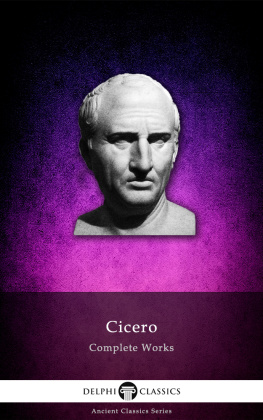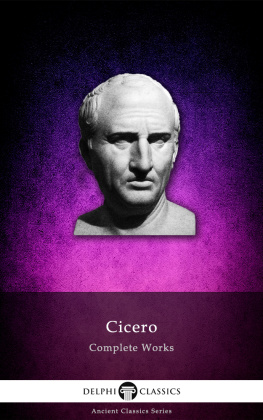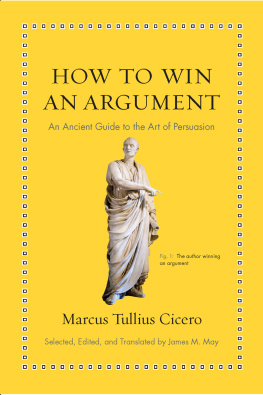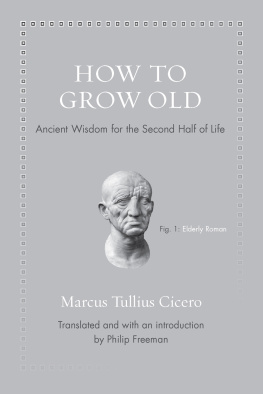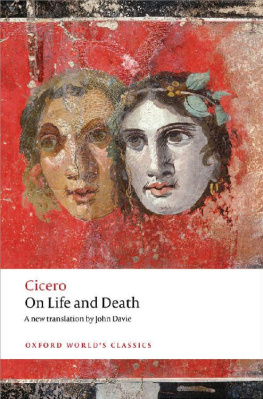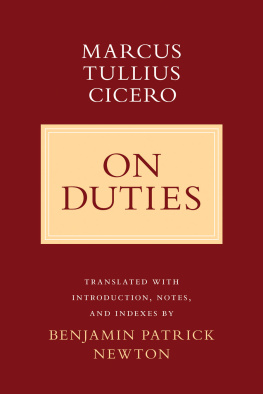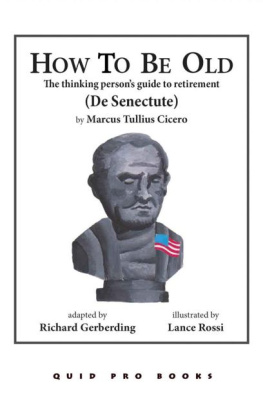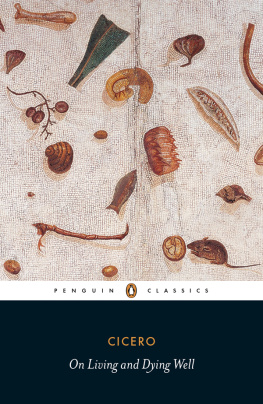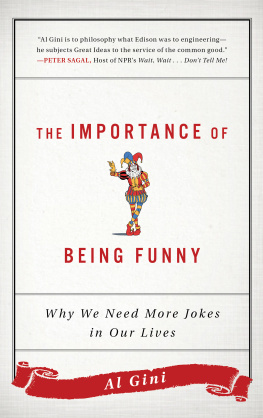HOW TO TELL A JOKE
ANCIENT WISDOM FOR MODERN READERS

How to Tell a Joke: An Ancient Guide to the Art of Humor by Marcus Tullius Cicero
How to Keep an Open Mind: An Ancient Guide to Thinking Like a Skeptic by Sextus Empiricus
How to Be Content: An Ancient Poets Guide for an Age of Excess by Horace
How to Give: An Ancient Guide to Giving and Receiving by Seneca
How to Drink: A Classical Guide to the Art of Imbibing by Vincent Obsopoeus
How to Be a Bad Emperor: An Ancient Guide to Truly Terrible Leaders by Suetonius
How to Be a Leader: An Ancient Guide to Wise Leadership by Plutarch
How to Think about God: An Ancient Guide for Believers and Nonbelievers by Marcus Tullius Cicero
How to Keep Your Cool: An Ancient Guide to Anger Management by Seneca
How to Think about War: An Ancient Guide to Foreign Policy by Thucydides
How to Be Free: An Ancient Guide to the Stoic Life by Epictetus
How to Be a Friend: An Ancient Guide to True Friendship by Marcus Tullius Cicero
How to Die: An Ancient Guide to the End of Life by Seneca
How to Win an Argument: An Ancient Guide to the Art of Persuasion by Marcus Tullius Cicero
How to Grow Old: Ancient Wisdom for the Second Half of Life by Marcus Tullius Cicero
How to Run a Country: An Ancient Guide for Modern Leaders by Marcus Tullius Cicero
How to Win an Election: An Ancient Guide for Modern Politicians by Quintus Tullius Cicero
HOW TO TELL A JOKE

An Ancient Guide to the Art of Humor
Marcus Tullius Cicero
Selected, translated, and introduced by Michael Fontaine
PRINCETON UNIVERSITY PRESS
PRINCETON AND OXFORD
Copyright 2021 by Princeton University Press
Princeton University Press is committed to the protection of copyright and the intellectual property our authors entrust to us. Copyright promotes the progress and integrity of knowledge. Thank you for supporting free speech and the global exchange of ideas by purchasing an authorized edition of this book. If you wish to reproduce or distribute any part of it in any form, please obtain permission.
Requests for permission to reproduce material from this work should be sent to
Published by Princeton University Press
41 William Street, Princeton, New Jersey 08540
6 Oxford Street, Woodstock, Oxfordshire OX20 1TR
press.princeton.edu
All Rights Reserved
Library of Congress Cataloging-in-Publication Data
Names: Cicero, Marcus Tullius, author. | Fontaine, Michael, editor, translator, writer of supplementary textual content. | Cicero, Marcus Tullius. De oratore. Liber 2.216290. English (Fontaine) | Cicero, Marcus Tullius. De oratore. Liber 2.216290. Latin (Fontaine) | Quintilian.
Institutiones oratoriae. Liber 6. Caput 3. English (Fontaine) | Quintilian. Institutiones oratoriae. Liber 6. Caput 3. Latin (Fontaine)
Title: How to tell a joke : an ancient guide to the art of humor / Marcus Tullius Cicero ; selected, translated, and introduced by Michael Fontaine.
Other titles: Ancient wisdom for modern readers.
Description: Princeton ; Oxford : Princeton University Press, 2021. | Series: Ancient wisdom for modern readers | Includes bibliographical references. | In English translation with original Latin text; introduction and epilogue in English.
Identifiers: LCCN 2020044600 (print) | LCCN 2020044601 (ebook) | ISBN 9780691206165 (hardcover) | ISBN 9780691211077 (ebook)
Subjects: LCSH: Wit and humorEarly works to 1800. | JokingEarly works to 1800.
Classification: LCC PA6308.D6 F66 2021 (print) | LCC PA6308.D6 (ebook) | DDC 875/.01dc23
LC record available at https://lccn.loc.gov/2020044600
LC ebook record available at https://lccn.loc.gov/2020044601
Version 1.0
Editorial: Rob Tempio and Matt Rohal
Production Editorial: Sara Lerner
Text and Jacket Design: Pamela L. Schnitter
Production: Erin Suydam
Publicity: Jodi Price and Amy Stewart
Copyeditor: Jennifer Harris
Jacket Image: Cicero / Photo: Shutterstock, adapted by ajibson
.
Cicero was seemingly addicted to laughter and to being a smartass.
PLUTARCH,
COMPARISON OF DEMOSTHENES AND CICERO (1.6)
ACKNOWLEDGMENTS
Jocus est sapientia magna,
et jocus interdum plus gravitate valet.
A joke is great wisdom,
and a joke sometimes outwits severity.
MATTHEW DELIUS,
THE ART OF JOKING (4.399400)
Delius is right, so it is a pleasure to thank Rob Tempio for letting me play Perkeo in this series once more. I am also grateful to Valzhyna Mort, Mark Saltveit, Tessy Schlosser, and Joel Stein for sharing their insights on comedy or translation with me, and to the two referees whose excellent suggestions made everything better.
On a personal note, my heartfelt thanks go to Xiomara Gmez for her constant support, and, of course, to Ava, Jake, and Alyssa. During the coronavirus lockdown of 2020, they were my first audience, and second, and third. I thank them for humoring me.
Last, I would like to acknowledge the advice and encouragement of George Thomas, who writes under the name Quintus Curtius, with a proverb he will recognize:
Quam quisque norit artem, in hac se exerceat.
We each ought ply the trade that we know best.
Here I go.
ITHACA, NEW YORK
INTRODUCTION
Is humor a teachable skill, or is it something youre born with? A couple thousand years ago, Cicero had some thoughts about that.
Born in 106 BCE, Marcus Tullius Cicero made it to the very top of ancient Rome. Against all the odds, at the age of 43 Cicero found himself elected ConsulRomes head of state, its chief executive, and commander-in-chief of its armed forces. He thwarted a coup attempt in his one year of office and was hailed as the savior of Rome. When his term was up, he resumed his private practice as a trial lawyer, but he remained a power player in Roman politics ever after. In retirement, he wrote philosophical treatises of profound and enduring impact. And if thats not enough, Cicero was also, according to one ancient source, one of the two funniest men in history.
In the twilight of classical antiquity, a writer named Macrobius quoted many of Ciceros jokes in a literary dialogue called The Saturnalia. Centuries earlier, Ciceros secretary, Tiro, had made a collection of them. (That collection is lost today, but Macrobius and the other writers mentioned in this volume still had it.) And in introducing the jokes, Macrobius adds an arresting remark:
The two most eloquent men that antiquity producedthe comedian Plautus and the orator Cicerowere also its two best at telling jokes. Who doesnt know that Ciceros enemies routinely used to call him the stand-up Consul?
That phrase, stand-up Consul (consularis scurra), is incredible. Ciceros opponents didnt mean he was a solid guy. They meant he was a chief executive who behaved like a stand-up comedian.
Macrobius wrote five hundred years after Ciceros death, but he was echoing contemporary sources. Some of them are quoted by Ciceros biographer, the Greek essayist Plutarch (ca. 46ca. 120 CE), who sized them up and said the same: Cicero often got carried away with the ridicule and veered into stand-up comedy.


